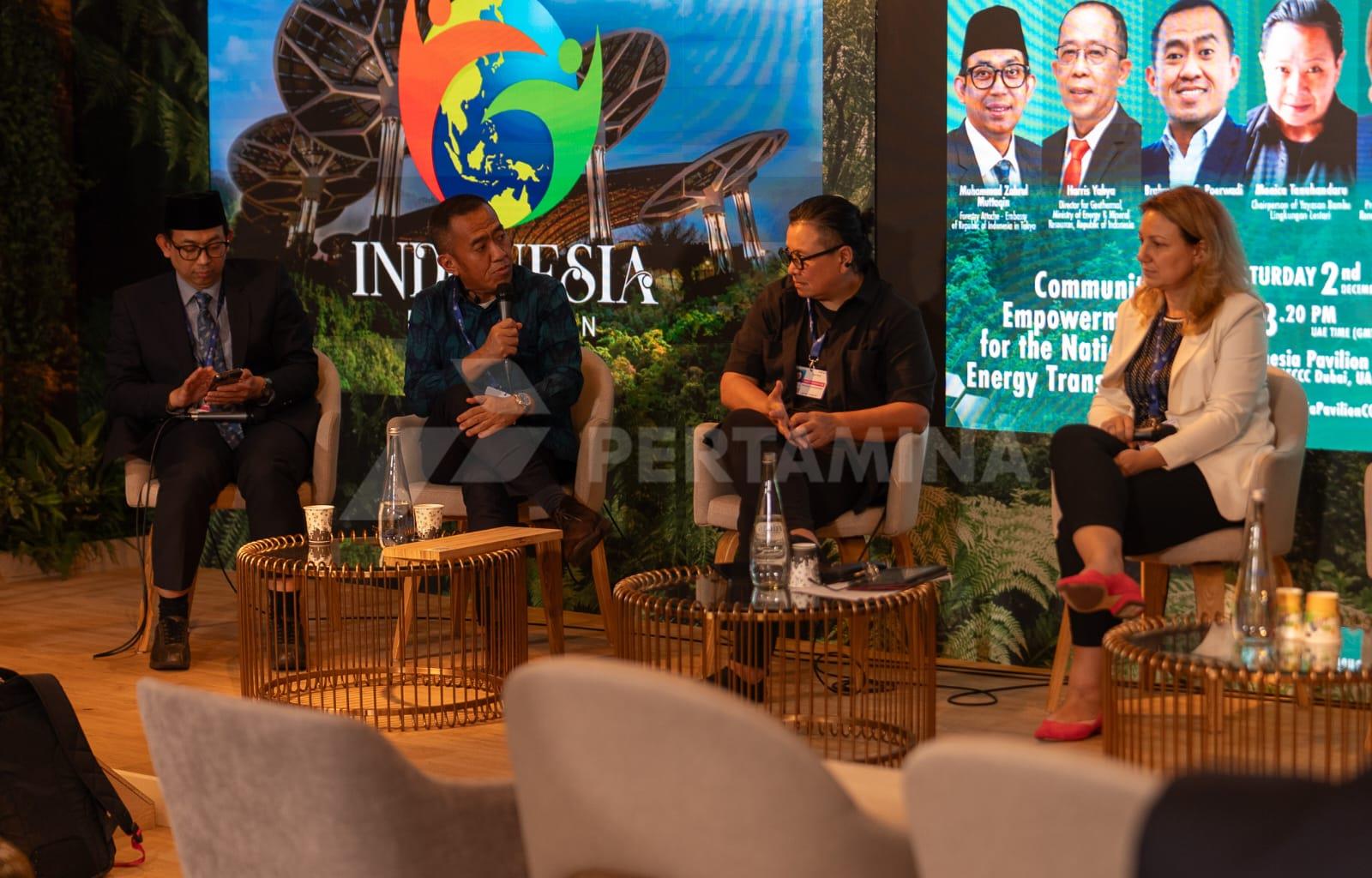
Pertamina Community Empowerment Program Showcased at COP28 Dubai
Dubai, December 4, 2023 - As a company committed to sustainability, PT Pertamina (Persero) collaborates with communities around its operational areas to promote social and economic well-being and energy independence. Pertamina's three Environmental and Social Responsibility Programs are Independent Energy Village, Pertamina Tourism Village, and Pertamina Forest.
During the 2023 United Nations Climate Change High-Level Conference or Conference of the Parties (COP) 28 in Dubai, United Arab Emirates, Corporate Secretary of Pertamina, Brahmantya S. Poerwadi, said the three programs are the company's efforts to provide social benefits to the community.
"Pertamina is the largest supplier of oil and gas in Indonesia, so we want to contribute to society," Brahmantya said on Saturday (2/12).
In a panel discussion titled "Community Empowerment for the National Energy Transition" at the Indonesian Pavilion, Brahmantya mentioned that Pertamina has 76 community programs for the Independent Energy Village. These include 57 solar power generation programs, 12 waste management programs producing methane and biogas, four micro hydro energy programs, two biodiesel conversion programs from household waste, and one hybrid wind and solar power generation program.
The Independent Energy Village program generates 287,519 Wp of energy from solar, hybrid (solar and wind) power generation, and micro-hydro power plants. Additionally, it produces 609,000 m3 per year of methane and biogas and 6,500 liters of biodiesel annually.
These 76 Independent Energy Village programs have benefited 4,113 households, with a total economic impact of IDR 1.93 billion per year and a reduction of 714,859 tons of CO2eq emissions yearly.
"We harness new and renewable energy (NRE) as a solution to the increasing energy needs of the community. Pertamina collaborates with various stakeholders because we believe clean and accessible energy will pave the way for economic development and community empowerment towards sustainable independence," Brahmantya explained.
For example, Brahmantya highlighted one of Pertamina's programs for the community, the solar energy development in Keliki Village, Ubud District, Gianyar Regency, Bali. Waste management, environmentally friendly villages, and agriculture are the main focus of this village. Keliki Village has a 28-kilowatt peak energy capacity, resulting in a total emission reduction of 36 tons of CO2eq per year.
Approximately 1,000 residents of Keliki Village and surrounding areas benefit from this program, reducing organic waste by more than 180 tons per year and saving water and electricity costs by over Rp60 million per year. "Solar power operates waste management facilities and seven irrigation channels or subak in Keliki Village," Brahmantya explained.
The second program, the Tourism Village Program, aims to create sustainable and self-reliant communities. This program supports the government's super-priority tourist destinations target, with Pertamina currently supporting the management of 794 micro, small, and medium-sized enterprises (MSMEs) homestays. This program has impacted 5,500 beneficiaries, contributing to the economic improvement of communities by IDR 600 million per year.
Meanwhile, the third program, the Pertamina Forest Program, focuses on conservation and reforestation by planting mangrove and terrestrial trees, aligning with Pertamina's commitment to Environmental, Social, Governance (ESG), and Sustainable Development Goals (SDGs) implementation.
Pertamina has 267 diversity programs for flora, including caring for more than 6 million mangrove plants and other terrestrial plants.
This program reduces emissions by 120 thousand tons of CO2eq per year. Besides that, Pertamina Forest can increase community income by IDR 1.8 billion per year and has a multiplier effect on 4,783 beneficiaries.
Three crucial aspects of village energy security development include access to clean energy, integrated programs, and collaboration with stakeholders.
Pertamina's collaboration in community empowerment is exemplified through bamboo preservation efforts. Monica Tanuhandaru, Chairman of the Environmental Bamboo Foundation, shared her experience collaborating with Pertamina. This collaboration involved creating a unified map platform that records all bamboo vegetation, including ecological mapping and community involvement.
"We can see carbon storage stocks and biodiversity potential," Monica said. She added that bamboo can be used as biofuel, biomass, and bioenergy. Together with Pertamina, the Environmental Bamboo Foundation is developing a restorative economy, balancing the economy with protection for environmental sustainability.
In the same discussion session, Ilina Stefanova, Program Officer of the International Renewable Energy Agency (IREA), added that community-based energy resilience is crucial in the energy transition. Energy transition efforts require public acceptance and support. Therefore, strategies that maximize social capital and empower communities will support the achievement of transition targets.
Meanwhile, Harris Yahya, Director of Geothermal at the Ministry of Energy and Mineral Resources, agreed that community involvement in the development of RE is essential. Moreover, Indonesia has diverse RE potentials.
Pertamina, as a leading company in the energy transition, is committed to supporting the Net Zero Emission 2060 target by continuously promoting programs that directly impact the Sustainable Development Goals (SDGs) achievement. All these efforts align with Environmental, Social & Governance (ESG) implementation across all Pertamina's business lines and operations.**